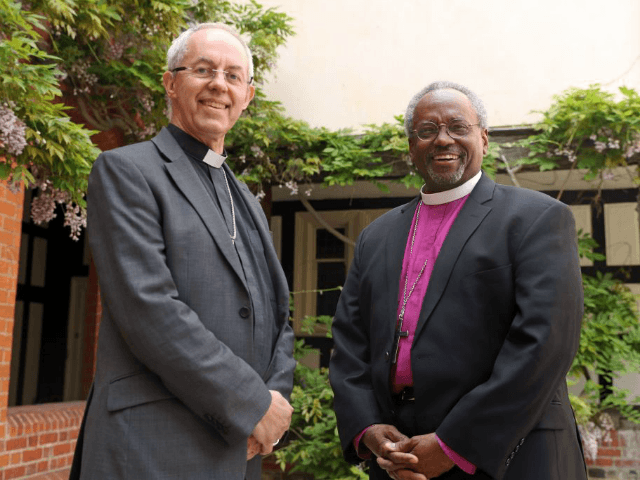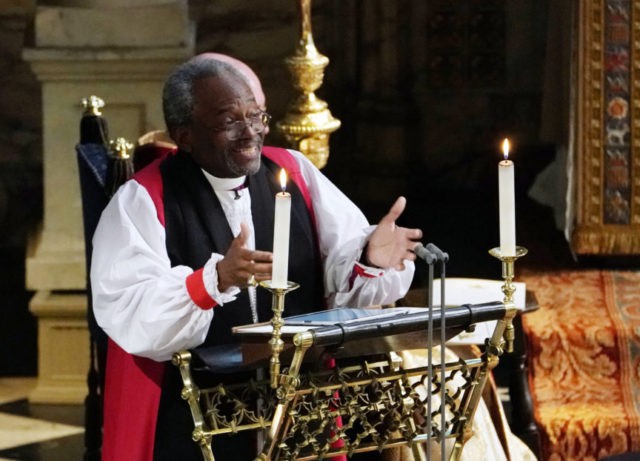While the Church of England plans to boost worship attendance with African-American-style preachers after gushing praise for the royal wedding, polls show the prospect of hearing sermons like highly publicised the one given by Rt Rev Michael Curry would actually make Britons less likely to attend.
A study by Christian think-tank Theos found that the nation as a whole was decidedly “ambivalent” about the Royal wedding address by the U.S. bishop — a big backer of LGBT weddings and transsexualism in the church — despite it receiving an “overwhelming” level of endorsement from the media and public figures like Labour MP Ed Miliband.
“We wanted to get beyond the initial frenzy. Lots of reactions that came immediately following the sermon perceived on social media and in the news headlines as a really significant moment,” Theos’s political director Paul Bickley explained.

The Archbishop of Canterbury Justin Welby, left, and American bishop Michael Curry pose for the media ahead of the wedding of Prince Harry and Meghan Markle on Saturday at St George’s Chapel, Windsor, England, Friday, May 18, 2018. (Steve Parsons/Pool Photo via AP)
Describing a “media frenzy” around the 14-minute homily, which — receiving 40,000 Twitter posts per minute, emerged as the most tweeted about moment of the ceremony, according to Christian website Premier — the think tank noted that journalists referred to Bishop Curry as “having ‘electrified’, ‘upstaged everyone’, ‘dazzled’, and ‘stole[n] the show’” at the event.
BBC and Church Elites Attack British Christians for Wanting Lower Immigration https://t.co/dWWw0FJxo3
— Breitbart London (@BreitbartLondon) February 5, 2018
“Public figures also documented their support on social media – supermodel Naomi Campbell tweeted ‘BISHOP MICHAEL CURRY GIVING ME LIFE’ and former leader of the Labour Party, Ed Miliband, suggested that ‘Rev Michael Curry could almost make me a believer’,” the report said.
Such “overwhelmingly positive” coverage of the sermon, Theos commented, was “noteworthy” in the context of a “modern Western society” where public expressions of faith are often met with “unease”, and media coverage of religion “often focuses on negative stories steeped in controversy such as abuse or terrorism.
“British media covered the story with almost unanimous positivity. However, our poll suggested that the general public were less absolute in their support,” said Charlotte Hobson, commenting on the ComRes survey, which asked a representative sample of British adults to what extent they agreed or disagreed with six statements.
“The statement ‘Bishop Curry’s sermon expressed ideas that people can easily agree with’ garnered the warmest response with 34% of the sample agreeing,” she notes, in a piece published on the think tank’s website.
Only 6 per cent of the more than 2,000 people polled “strongly agreed” they would be more likely to go to church if there was preaching similar to Bishop Curry’s, and 11 per cent said they “tended to agree”.
Trans People Urged to Become Priests in Church of England Drive ‘to Honour LGBT+ People’ https://t.co/1Mb4gKGLZJ
— Breitbart London (@BreitbartLondon) May 28, 2018
However, 27 per cent “strongly disagreed” with the statement, and a further 11 per cent said they “tended to disagree” with the statement, while a further 20 per cent opted to “neither agree not disagree” with the assertion.
Asked whether it was “appropriate” for Church leaders to use occasions like the Royal wedding to mix “religion and politics” in light of Bishop Curry’s address, just 8 per cent said they “strongly agree” and 14 per cent ‘tended to agree’.
Contention over the statement was much stronger, with 20 per cent of respondents registering strong disagreement and 12 per cent stating that they tend to disagree.
The Chicago-born pastor was said to have delivered a “radical” message and injected “a dose of civil rights” into the wedding, in The Guardian, which published a raft of articles lavishing praise on his sermon, which both began and closed quoting Martin Luther King Jr.
Curry was described an “ardent campaigner for social justice, particularly on immigration and same-sex marriage” who “did it black … [and] shocked the congregation by refusing to tone down his passionate message on power and love” in one of the left-wing newspaper’s pieces on the topic, while another declared his homily “a celebration of blackness”.
Christians Aren’t Leaving the Church, the Church is Leaving Them, Writes @DavidKurten https://t.co/dvgcLs20i4
— Breitbart London (@BreitbartLondon) February 5, 2018
The pastor’s appearance at the Royal wedding came on the recommendation of the Archbishop of Canterbury, Justin Welby, who after the wedding gushed that his free-flowing sermon on “the power of love” that “blew the place open”, claiming everyone who witnessed it had been “gripped by it”.
Thus, it was last week reported that the Church of England is “to capitalise on the success” of Curry’s sermon by altering church law so as to make it easier for pastors from UK churches in black communities which share his style of preaching.
The Rev Dr Will Adam, the Archbishop of Canterbury’s ecumenical adviser, said: “We saw through the amazing reaction to Bishop Curry’s sermon how the nation really sat up and listened when they heard the gospel preached with passion and without reserve.
“If enabling parishes to forge closer relationships with some of the most dynamic churches in this country helps bring new life and new ideas to our congregations that can only be a good thing.”

COMMENTS
Please let us know if you're having issues with commenting.